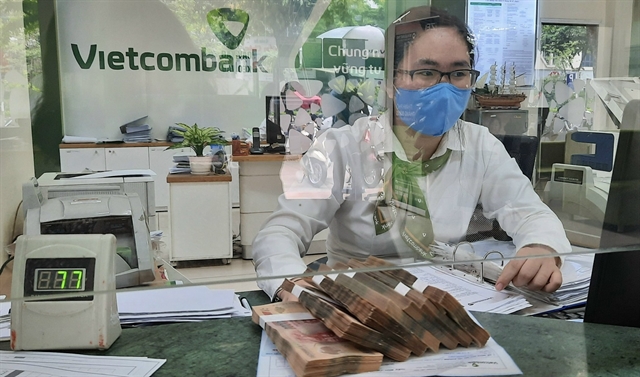Some large real estate corporations are finding solutions to raise capital as the bond market has frozen since April.

With a decline in confidence, many investors find ways to flee corporate bonds, triggering a severe liquidity shortage at companies that issue bonds. As a result, it is crucial to win back investors' confidence and draw cash back to the market.
There was no corporate bond issuance in the first three weeks of October, data from the Vietnam Bond Market Association (VBMA) showed, meaning that a month after Decree 65 on private placement of corporate bonds took effect, the corporate bond market remained mute.
This year, the value of corporate bonds has dipped by nearly 50 per cent over last year.
On the other hand, under pressure from investors (bondholders), many issuers have to boost bond buybacks before the maturity date. For the year, the total value of redeemed bonds by businesses is nearly VND142.5 trillion (US$5.7 billion), a gain of 46 per cent year-on-year.
Businesses face the risk of cash flow disruption after investors panicked to withdraw from the bond market while issuers have been unable to release new bonds.
According to FiinGroup data, the amount of mature real estate corporate bonds will be more than VND35 trillion in 2022 and over VND61 trillion in 2023, which are mainly from unlisted enterprises.
Many investors became cautious with corporate bonds after the scandals of Tan Hoang Minh, An Dong and VKC Holdings. Many people rushed to ask for businesses to repurchase bonds before their maturity date.
The bond market will continue to face challenges due to the decline in investor confidence, while the real estate market is also in a tough situation and businesses witness negative cash flows as banks' credit room reaches its limit, Le Xuan Nghia, a member of the National Financial and Monetary Policy Advisory Council, told baodautu.vn.
Meanwhile, Bui Van Huy, director of DSC Securities Corporation's HCM City branch office, said that the lack of reliable information is the reason for the lower confidence in the corporate bond market and the hesitance of investors. Therefore, when it comes to corporate bonds, investors are reluctant to participate, regardless of whether the deal is good or bad.
"It is a natural instinct for investors to worry if bonds have problems. However, during these past years, many investors have acted on crowd psychology, meaning that if others withdraw corporate bonds, they also withdraw without analysing their own corporate bonds. This phenomenon has caused damage to investors themselves and put great pressure on the market," Huy said, adding that investors need to calm down and carefully evaluate the type of corporate bonds they are holding.
Luring cash flows
Real estate companies' bond issuance activities have almost frozen since April, after the case of Tan Hoang Minh shocked the whole market. The late repayment of principal and interest by some businesses caused investors to worry.
Viet Dragon Securities Company (VDSC) said that Decree 65 and the recent scandals involving two major property developers have capped capital supplies for businesses, especially real estate companies, causing firms in this industry to be under great liquidity pressure in the last months of the year.
Moreover, the real estate industry entered a bear market while facing problems of a capital shortage due to tight credit, rising interest rates, and policies to prevent speculation.
"Cash flow pressure arises in the short term, while the reduction in sales may cause some businesses with large amounts of private placement bonds to fall into the risk of insolvency. For retail investors, bondholders who do not receive principal and interest on time, may indirectly face cash flow difficulties," VDSC experts said.
A report by the State Bank of Vietnam (SBV) shows that as of June, the amount of bad debt in corporations reached about VND3 trillion. Some banks are dealing with bonds.
Some large real estate corporations are finding solutions to raise capital. Many real estate corporations are raising capital from individuals in the form of "loan contracts" with interest rates up to 12-13 per cent a year to have a source for mature bonds. Some other corporations are considering a "barter" solution, meaning that instead of buying back bonds from investors, businesses encourage bondholders to convert bonds into real estate products.
"This method has been used for a long time in China but has just appeared in Viet Nam. Instead of repurchasing bonds, enterprises allow bondholders to convert bonds into real estate products, such as apartments, subdivision land, and even villas. If the value of the land lot is higher than the bond investment balance, investors can find a group of bondholders to consolidate and switch to jointly owning that land lot," said Nguyen Quang Thuan, Chairman of FiinGroup.
According to the lawyers, this form is completely valid and legal, as long as the conversion price matches the market price and is approved by the investor. However, experts recommend that when choosing the "barter" method for mature bonds, investors should carefully study the legal status of real estate projects; otherwise, there will be risks of switching to a riskier asset. VNS





